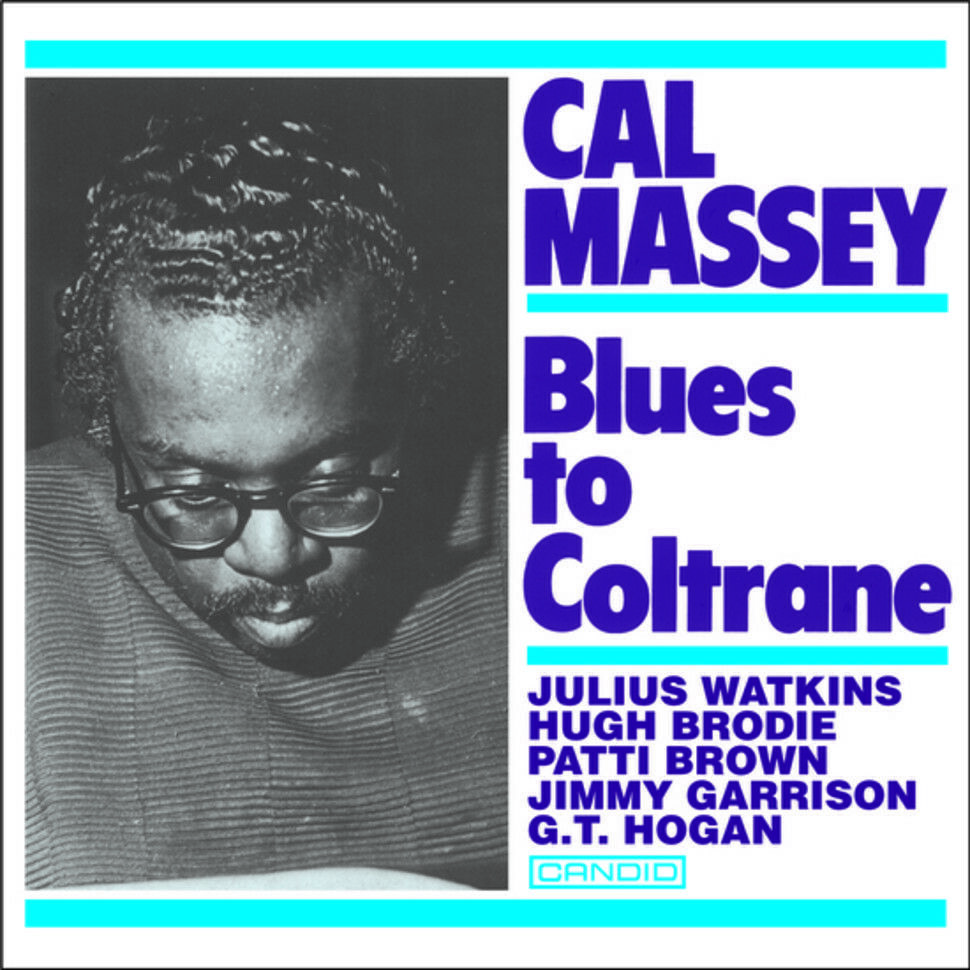Posthumous release doesn’t do justice to the vision and artistry of Cal Massey.
Personnel
Cal Massey (trumpet), Hugh Brodie (tenor sax), Julius Watkins (French horn), Patti Bown (piano), Jimmy Garrison (bass), G.T. Hogan (drums)
Recorded
on January 17, 1961 at Nola Penthouse Sound Studio, New York City
Released
as CS 9029 in 1987
Track listing
Side A:
Blues To Coltrane
What’s Wrong
Bakai
Side B:
These Are Soulful Days
Father And Son
Imagine bassist Jimmy Garrison on his first working day with John Coltrane in late 1961. “By the way, John, I did this record with your old friend Cal Massey back in January, they gonna call it Blues To Coltrane, dig?” What is there to answer when people start honoring you when you have only been present on the planet for about thirty-four years? No telling if Coltrane ever heard the tapes from his pal Cal.
Blues To Coltrane is the only album by trumpeter and composer Cal Massey. I remember, back in the day, that I discovered the records of Lee Morgan, chief among them Leeway which included the wonderful and to my ear pretty immortal melody These Are Soulful Days. It was written by Cal Massey and I remember thinking that this must be a hip musical mind. I soon after enjoyed the killer version by organist Don Patterson.
Cal Massey was a great composer. Massey, from Philadelphia, where Garrison and Coltrane were raised and Morgan was born, led a band in the mid-50s that included McCoy Tyner, Garrison and Albert “Tootie” Heath and occasionally featured Coltrane and Donald Byrd. Having relocated to New York, Massey eventually shunned live performances altogether and focused on work as arranger and composer. Notably, Bakai and Nakatani Suite were recorded by Coltrane. Morgan recorded six tunes by Massey and Archie Shepp (who was from Philly and lured Massey out of hiding and formed a group from 1969 till ’72) no less than nine Massey compositions. Jackie McLean recorded Message From Trane and Charlie Parker put Fiesta on wax as early as 1951.
You know Massey. There’s the tune Cal Massey on Clifford Jordan’s eponymous Glass Bead Games.
Massey’s Black Liberation Movement Suite from 1970 was recently brought to life by Fred Ho (and Quincy Saul), who has provided most of Massey’s biographical details over the years. It is suggested by Ho that Massey’s affiliation with the militant Black Panthers prevented the release of Blues To Coltrane on Nat Hentoff’s Candid label. This may or may not be true. Massey supported Eldridge Cleaver but also wrote Dr. King, The Peaceful Warrior. It is more likely that Hentoff and Massey were not completely satisfied with the results of their session.
Blues To Coltrane ain’t bad and saying this perhaps says it all. Sometimes it’s hard to put a finger on slightly disappointing listening experiences. Lack of purpose is the best explanation I can give. Besides, another explanation, it’s hard to deny, is a horribly out-of-tune piano, which ruins the playing of the fine female pianist Patti Bown.
The fast rendition of Massey’s classic These Are Soulful Days is not without bite but feels a bit hurried. To be sure, Massey’s tunes are marvelous, excluding the tepid 12 bar blues Blues To Coltrane. Particularly Bakai, What’s Wrong and Father And Son are challenging and varying playgrounds for all concerned and the session’s rabbit in the hat, tenor saxophonist Hugh Brodie, wrestles with them with zest and Coltranesque flair. Garrison and G.T. Hogan form a crisp rhythm section. Massey may seem a bit unfocused at times but plays with a lot of space and a lovely tart tone. He was mentored by Freddie Webster, who tellingly was an example for Miles Davis as well.
Massey himself eventually turned into a notable mentor. He passed away in 1972 at the age of 44.

